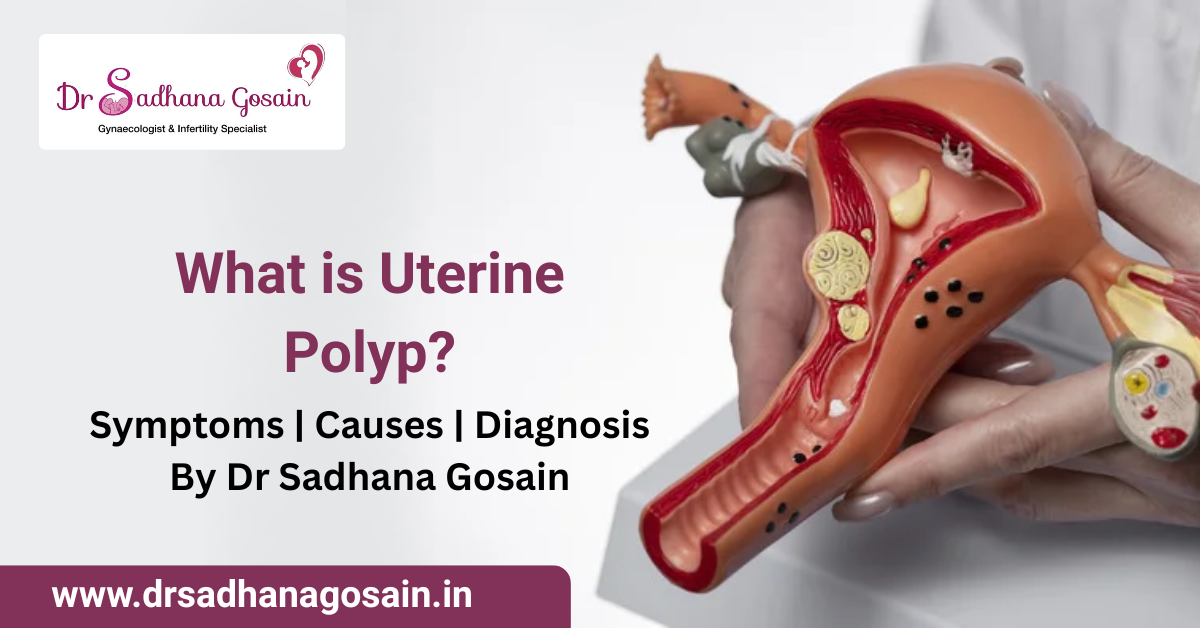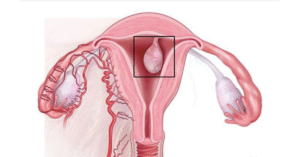
What is Uterine Polyp? Understanding Symptoms, Causes, and Diagnosis

What is Uterine Polyp: Uterine health plays a vital role in the overall well-being of women, especially during reproductive years. One common but often overlooked condition affecting the uterus is the development of uterine polyps. If you’ve ever asked, “What is uterine polyp?“—you’re not alone. Many women are unaware of this condition until they experience symptoms or undergo a routine gynecological check-up.

What is Uterine Polyp
In this article, we’ll explore everything you need to know about uterine polyps, including symptoms, causes, diagnosis, and when to consult a specialist like Gynecologist in Delhi – Dr Sadhana Gosain.
What is Uterine Polyp?
A uterine polyp, also known as an endometrial polyp, is a growth that forms in the inner lining of the uterus, called the endometrium. These polyps are usually non-cancerous (benign), although in rare cases, they can become cancerous or precancerous. They can vary in size, from a few millimeters to several centimeters, and may be single or multiple.
Uterine polyps are attached to the uterine wall by a thin stalk or a broad base and may extend into the uterine cavity. While many women with uterine polyps do not experience symptoms, others may have noticeable issues that affect their menstrual cycle or fertility.
View this post on Instagram
Uterine Polyp Symptoms
So, how can you tell if you might have a uterine polyp? Uterine polyp symptoms can be subtle or obvious, and they often mimic other gynecological conditions, making diagnosis challenging without medical evaluation.
Common symptoms include:
-
Irregular menstrual bleeding: This is the most frequent symptom. You may notice unusually heavy periods (menorrhagia), spotting between periods, or bleeding after intercourse.
-
Postmenopausal bleeding: Any bleeding after menopause is considered abnormal and could indicate a uterine polyp or other issue.
-
Infertility: In some cases, uterine polyps interfere with embryo implantation, potentially contributing to infertility.
-
Pelvic pain or pressure: While rare, larger polyps may cause discomfort or a sensation of fullness in the lower abdomen.
-
Anemia: Chronic heavy bleeding may lead to low hemoglobin levels, resulting in fatigue and weakness.
It’s important to note that not all polyps cause symptoms, so regular gynecological check-ups are essential for early detection.
For More:
View this post on Instagram
Uterine Polyp Causes
The exact reason why uterine polyps develop is still under investigation, but several factors are believed to contribute to their formation. Uterine polyp causes include:
-
Hormonal Imbalance: Estrogen plays a significant role in the growth of the endometrial lining. An excess of estrogen or unbalanced hormone levels can trigger polyp formation.
-
Age: Most uterine polyps occur in women between 40 and 50 years of age, although they can occur at any age.
-
Obesity: Excess body fat can lead to higher estrogen levels, increasing the risk of developing polyps.
-
High Blood Pressure: Some studies suggest a correlation between hypertension and polyp development.
-
Certain Medications: Hormone therapies or medications like tamoxifen (used in breast cancer treatment) may also raise the risk.
-
Other Conditions: Women with a history of polycystic ovary syndrome (PCOS), endometriosis, or uterine fibroids may be more prone to developing polyps.
Understanding the causes can help with prevention and early intervention, especially if you’re in a higher-risk group.
Uterine Polyp Diagnosis
If you’re experiencing symptoms or your doctor suspects a uterine polyp, there are several ways to confirm the diagnosis. Uterine polyp diagnosis usually involves imaging tests and may require a minor surgical procedure.
-
Transvaginal Ultrasound: This is often the first step. It allows the doctor to visualize the inside of the uterus and detect abnormalities like thickening or growths.
-
Sonohysterography: In this procedure, sterile fluid is introduced into the uterus via a catheter during ultrasound. The fluid helps in getting a clearer picture of the uterine cavity.
-
Hysteroscopy: This involves inserting a thin, lighted telescope-like device into the uterus through the vagina and cervix. It provides a direct view of the uterine cavity and allows for biopsy or removal of polyps.
-
Endometrial Biopsy: A small sample of the uterine lining is collected and examined under a microscope. While this may not confirm a polyp, it can rule out cancer or other abnormalities.
Once diagnosed, your doctor will decide the best course of treatment based on your symptoms, age, and reproductive goals.
View this post on Instagram
Treatment Options
Treatment isn’t always necessary, especially if the polyp is small and asymptomatic. However, removal is usually recommended if:
-
The polyp causes bleeding or other symptoms
-
You’re at increased risk for cancer
-
You have fertility issues
Polypectomy, the surgical removal of polyps, is often done during a hysteroscopy. The procedure is minimally invasive, and recovery is typically quick.
In some cases, medications like progestins or hormone-releasing IUDs may help manage symptoms but are not a permanent solution, as polyps often return once medication is stopped.
When to See a Gynecologist?
If you’re experiencing abnormal bleeding, pelvic discomfort, or trouble conceiving, it’s essential to consult a qualified specialist. An experienced gynecologist can guide you through proper testing and treatment.
For women living in or near Delhi, Gynecologist in Delhi – Dr Sadhana Gosain is a trusted name in women’s healthcare. With years of expertise in diagnosing and treating uterine conditions, Dr. Gosain provides personalized care in a comfortable and professional setting.
Conclusion – What is Uterine Polyp
Uterine polyps are common and typically benign, but they shouldn’t be ignored—especially if you’re experiencing symptoms. Early detection and appropriate treatment can help prevent complications such as heavy bleeding, anemia, or fertility issues.
Understanding what is uterine polyp, recognizing the uterine polyp symptoms, being aware of the uterine polyp causes, and undergoing timely uterine polyp diagnosis are crucial steps toward maintaining optimal reproductive health.
Whether you’re seeking clarity about your symptoms or simply want a routine check-up, don’t hesitate to consult a qualified gynecologist. Dr Sadhana Gosain, a leading Gynecologist in Delhi, is here to help you navigate your journey to better health with compassion and care.
Also Read:

